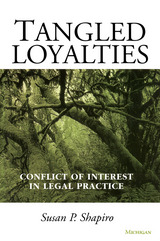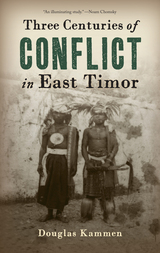137 books about Conflict and 4
start with T
137 books about Conflict and 4
137 books about Conflict
4 start with T start with T
4 start with T start with T

Tangled Loyalties
Conflict of Interest in Legal Practice
Susan P. Shapiro
University of Michigan Press, 2002
In Tangled Loyalties, Susan P. Shapiro charts a journey across the state of Illinois. To explore the role of conflict-of-interest in the private practice of law she looks at a wide variety of law firms, including those located near lakes, rivers, and corn fields; in strip malls, storefronts, and historic landmarks; in town squares, residential neighborhoods, deteriorating downtown areas, and glittering high rises.
This unique, empirical study examines the actual attitudes and perceptions of legal practitioners. The author discusses the realities of the profession--what lawyers face day to day, how they deal with conflicts of interest, and how those experiences vary from LaSalle Street to Wall Street to Main Street, from megafirms to solo practices. In describing how conflicts arise in their daily work, Shapiro sheds light on the nature of legal work--on clients, colleagues, law firm power and politics, economics, markets, malpractice insurance, careers, ethics, values, business judgments, and lawyers' most anguishing moments. In short, we learn what it means to be a lawyer at the end of the twentieth century.
Tangled Loyalties also looks at how these conflicts in law affect other fiduciaries--accountants, doctors, psychotherapists, journalists, and academics--and the way in which they respond to competing interests and the honoring of those interests.
Tangled Loyalties will appeal to readers interested in the legal and other professions, social institutions and relations, and issues of trust, ethics, social control and regulation.
Susan P. Shapiro is Senior Research Fellow, American Bar Foundation.
This unique, empirical study examines the actual attitudes and perceptions of legal practitioners. The author discusses the realities of the profession--what lawyers face day to day, how they deal with conflicts of interest, and how those experiences vary from LaSalle Street to Wall Street to Main Street, from megafirms to solo practices. In describing how conflicts arise in their daily work, Shapiro sheds light on the nature of legal work--on clients, colleagues, law firm power and politics, economics, markets, malpractice insurance, careers, ethics, values, business judgments, and lawyers' most anguishing moments. In short, we learn what it means to be a lawyer at the end of the twentieth century.
Tangled Loyalties also looks at how these conflicts in law affect other fiduciaries--accountants, doctors, psychotherapists, journalists, and academics--and the way in which they respond to competing interests and the honoring of those interests.
Tangled Loyalties will appeal to readers interested in the legal and other professions, social institutions and relations, and issues of trust, ethics, social control and regulation.
Susan P. Shapiro is Senior Research Fellow, American Bar Foundation.
[more]

A Territory in Conflict
Eras of Development and Urban Architecture in Gaza
Fatina Abreek-Zubiedat
University of Pittsburgh Press, 2025
A new addition to the University of Pittsburgh Press Culture Politics & the Built Environment series
[more]

Three Centuries of Conflict in East Timor
Kammen, Douglas
Rutgers University Press, 2015
One of the most troubling but least studied features of mass political violence is why violence often recurs in the same place over long periods of time. Douglas Kammen explores this pattern in Three Centuries of Conflict in East Timor, studying that region’s tragic past, focusing on the small district of Maubara.
Once a small but powerful kingdom embedded in long-distance networks of trade, over the course of three centuries the people of Maubara experienced benevolent but precarious Dutch suzerainty, Portuguese colonialism punctuated by multiple uprisings and destructive campaigns of pacification, Japanese military rule, and years of brutal Indonesian occupation. In 1999 Maubara was the site of particularly severe violence before and after the UN-sponsored referendum that finally led to the restoration of East Timor’s independence. Beginning with the mystery of paired murders during East Timor’s failed decolonization in 1975 and the final flurry of state-sponsored violence in 1999, Kammen combines an archival trail and rich oral interviews to reconstruct the history of the leading families of Maubara from 1712 until 2012.
Kammen illuminates how recurrent episodes of mass violence shaped alliances and enmities within Maubara as well as with supra-local actors, and how those legacies have influenced efforts to address human rights violations, post-conflict reconstruction, and the relationship between local experience and the identification with the East Timorese nation. The questions posed in Three Centuries of Conflict in East Timor about recurring violence and local narratives apply to many other places besides East Timor—from the Caucasus to central Africa, and from the Balkans to China—where mass violence keeps recurring.
Download open access ebook here.
Download open access ebook here.
[more]

Titles, Conflict, and Land Use
The Development of Property Rights and Land Reform on the Brazilian Amazon Frontier
Lee J. Alston, Gary D. Libecap, and Bernardo Mueller
University of Michigan Press, 1999
The Amazon, the world's largest rain forest, is the last frontier in Brazil. The settlement of large and small farmers, squatters, miners, and loggers in this frontier during the past thirty years has given rise to violent conflicts over land as well as environmental duress. Titles, Conflict, and Land Use examines the institutional development involved in the process of land use and ownership in the Amazon and shows how this phenomenon affects the behavior of the economic actors. It explores the way in which the absence of well-defined property rights in the Amazon has led to both economic and social problems, including lost investment opportunities, high costs in protecting claims, and violence. The relationship between land reform and violence is given special attention.
The book offers an important application of the New Institutional Economics by examining a rare instance where institutional change can be empirically observed. This allows the authors to study property rights as they emerge and evolve and to analyze the effects of Amazon development on the economy. In doing so they illustrate well the point that often the evolution of economic institutions will not lead to efficient outcomes.
This book will be important not only to economists but also to Latin Americanists, political scientists, anthropologists, and scholars in disciplines concerned with the environment.
Lee Alston is Professor of Economics, University of Illinois, and Research Associate for the National Bureau of Economic Research. Gary Libecap is Professor of Economics and Law, University of Arizona, and Research Associate for the National Bureau of Economic Research. Bernardo Mueller is Assistant Professor, Universidade de Brasilia.
The book offers an important application of the New Institutional Economics by examining a rare instance where institutional change can be empirically observed. This allows the authors to study property rights as they emerge and evolve and to analyze the effects of Amazon development on the economy. In doing so they illustrate well the point that often the evolution of economic institutions will not lead to efficient outcomes.
This book will be important not only to economists but also to Latin Americanists, political scientists, anthropologists, and scholars in disciplines concerned with the environment.
Lee Alston is Professor of Economics, University of Illinois, and Research Associate for the National Bureau of Economic Research. Gary Libecap is Professor of Economics and Law, University of Arizona, and Research Associate for the National Bureau of Economic Research. Bernardo Mueller is Assistant Professor, Universidade de Brasilia.
[more]
READERS
Browse our collection.
PUBLISHERS
See BiblioVault's publisher services.
STUDENT SERVICES
Files for college accessibility offices.
UChicago Accessibility Resources
home | accessibility | search | about | contact us
BiblioVault ® 2001 - 2024
The University of Chicago Press









